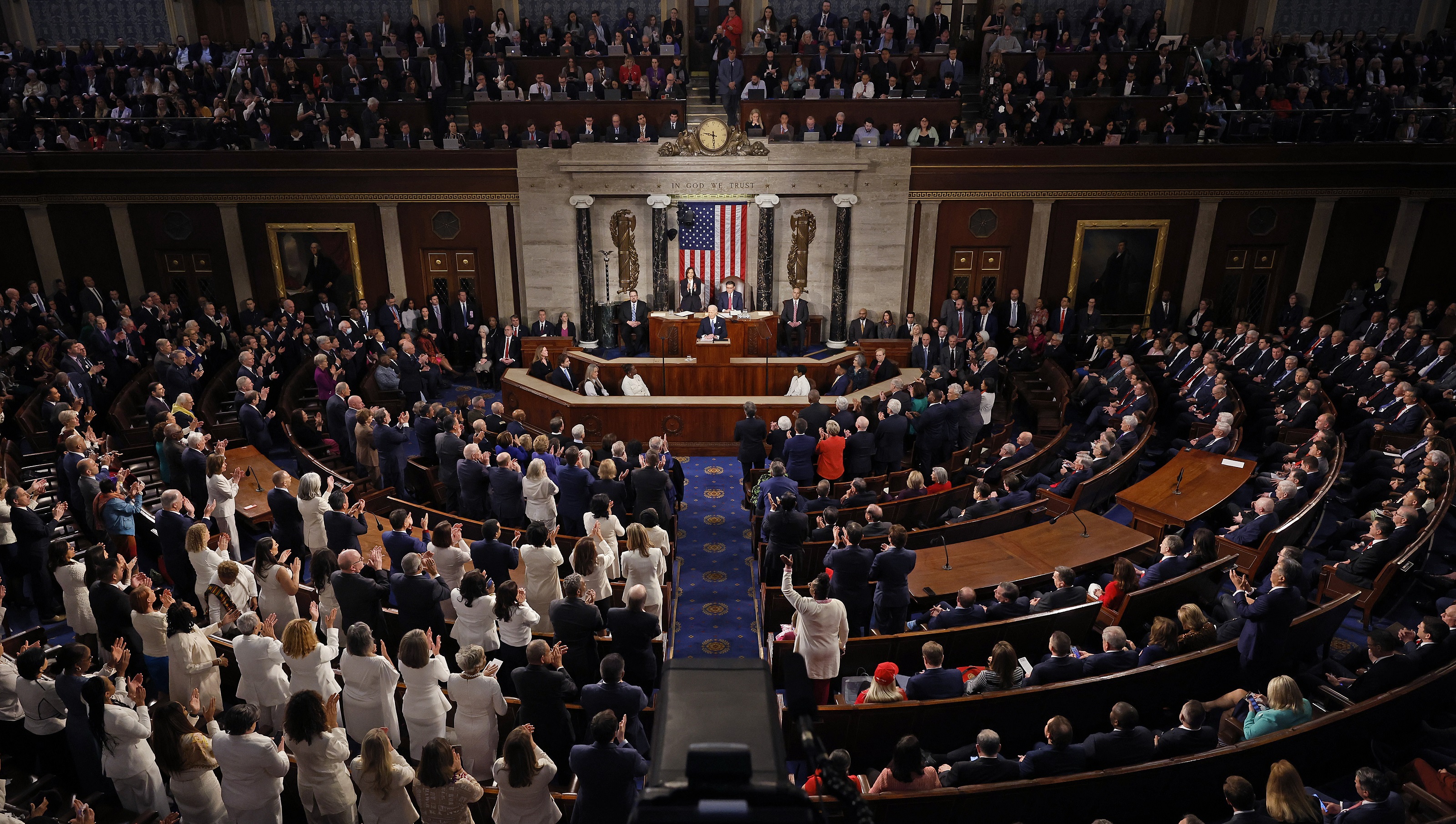Biden Spotlights Drug Prices, Medicare, Social Security in State of the Union
Biden calls for expanding Medicare drug price negotiations to include up to 500 drugs over next decade.


Profit and prosper with the best of Kiplinger's advice on investing, taxes, retirement, personal finance and much more. Delivered daily. Enter your email in the box and click Sign Me Up.
You are now subscribed
Your newsletter sign-up was successful
Want to add more newsletters?

Delivered daily
Kiplinger Today
Profit and prosper with the best of Kiplinger's advice on investing, taxes, retirement, personal finance and much more delivered daily. Smart money moves start here.

Sent five days a week
Kiplinger A Step Ahead
Get practical help to make better financial decisions in your everyday life, from spending to savings on top deals.

Delivered daily
Kiplinger Closing Bell
Get today's biggest financial and investing headlines delivered to your inbox every day the U.S. stock market is open.

Sent twice a week
Kiplinger Adviser Intel
Financial pros across the country share best practices and fresh tactics to preserve and grow your wealth.

Delivered weekly
Kiplinger Tax Tips
Trim your federal and state tax bills with practical tax-planning and tax-cutting strategies.

Sent twice a week
Kiplinger Retirement Tips
Your twice-a-week guide to planning and enjoying a financially secure and richly rewarding retirement

Sent bimonthly.
Kiplinger Adviser Angle
Insights for advisers, wealth managers and other financial professionals.

Sent twice a week
Kiplinger Investing Weekly
Your twice-a-week roundup of promising stocks, funds, companies and industries you should consider, ones you should avoid, and why.

Sent weekly for six weeks
Kiplinger Invest for Retirement
Your step-by-step six-part series on how to invest for retirement, from devising a successful strategy to exactly which investments to choose.
President Joe Biden touted his administration’s achievements so far and vowed to protect Social Security and Medicare and fight high drug prices as he addressed the nation in his State of the Union address last night (March 7).
"Tonight, let's all agree once again to stand up for seniors. Many of my friends on the other side of the aisle want to put Social Security on the chopping block," he said. "Anyone here who tries to cut Social Security, Medicare or raise the retirement age, I will stop you."
With the general election just months away, Biden tackled a range of issues and called on Congress to expand certain provisions under his landmark Inflation Reduction Act (IRA). These include the Medicare Drug Price Negotiations program, which allows Medicare for the first time to enter pricing talks with drugmakers to reduce the costs of some of the highest-priced Part D drugs prescribed in the U.S.
From just $107.88 $24.99 for Kiplinger Personal Finance
Become a smarter, better informed investor. Subscribe from just $107.88 $24.99, plus get up to 4 Special Issues

Sign up for Kiplinger’s Free Newsletters
Profit and prosper with the best of expert advice on investing, taxes, retirement, personal finance and more - straight to your e-mail.
Profit and prosper with the best of expert advice - straight to your e-mail.
Negotiations are now underway for the first 10 drugs under the program, and plans call for adding up to 60 more drugs to the program during the next four years and up to 20 additional drugs per year after that.
Last night, the president called for adding 500 drugs over the next decade.
"We finally gave Medicare the power to negotiate, just like the VA is able to do for veterans," he said. "That's not just saving seniors money. It's saving taxpayers money. We cut the federal deficit by $160 billion because Medicare will no longer have to pay those exorbitant prices to Big Pharma."
Next year under the same law, total prescription drug costs for Medicare beneficiaries will be capped at $2,000 annually. Biden said he wants to cap these costs at $2,000 for everyone.
"I'm also getting rid of junk fees," Biden said, highlighting his administration’s proposed rules to eliminate junk or hidden fees in a range of markets including banking, cable and travel. He noted the recent finalization of the junk fee banking rule that caps credit card late fees at $8, down from the current $32.
Republican response to the State of the Union
Biden, who spoke before a joint session of Congress, faces tough opposition from Republicans on many of his policies and programs. His delivered the address just two days after the Super Tuesday primaries, where former President Donald Trump swept the GOP nomination in most states and is the presumptive nominee to square off against him in the 2024 presidential race.
Last night was a key opportunity for Biden to claim economic victories for his administration, given low consumer sentiment about the economy as Americans faced inflation and uncertainty in the wake of the COVID pandemic.
Sen. Katie Boyd Britt (R-AL), the youngest Republican woman ever elected to the Senate, delivered the GOP response following Biden’s address, saying that the president "just doesn't get it."
She said that families are worse off under his administration. "Hardworking families are struggling to make ends meet today. And with soaring mortgage rates and sky-high childcare costs, they're also struggling to plan for tomorrow," she said.
RELATED CONTENT
Profit and prosper with the best of Kiplinger's advice on investing, taxes, retirement, personal finance and much more. Delivered daily. Enter your email in the box and click Sign Me Up.

Esther D’Amico is Kiplinger’s senior news editor. A long-time antitrust and congressional affairs journalist, Esther has covered a range of beats including infrastructure, climate change and the industrial chemicals sector. She previously served as chief correspondent for a financial news service where she chronicled debates in and out of Congress, the Department of Justice, the Federal Trade Commission and the Commerce Department with a particular focus on large mergers and acquisitions. She holds a bachelor’s degree in journalism and in English.
-
 Quiz: Do You Know How to Avoid the "Medigap Trap?"
Quiz: Do You Know How to Avoid the "Medigap Trap?"Quiz Test your basic knowledge of the "Medigap Trap" in our quick quiz.
-
 5 Top Tax-Efficient Mutual Funds for Smarter Investing
5 Top Tax-Efficient Mutual Funds for Smarter InvestingMutual funds are many things, but "tax-friendly" usually isn't one of them. These are the exceptions.
-
 AI Sparks Existential Crisis for Software Stocks
AI Sparks Existential Crisis for Software StocksThe Kiplinger Letter Fears that SaaS subscription software could be rendered obsolete by artificial intelligence make investors jittery.
-
 Quiz: Do You Know How to Avoid the 'Medigap Trap?'
Quiz: Do You Know How to Avoid the 'Medigap Trap?'Quiz Test your basic knowledge of the "Medigap Trap" in our quick quiz.
-
 We Retired at 62 With $6.1 Million. My Wife Wants to Make Large Donations, but I Want to Travel and Buy a Lake House.
We Retired at 62 With $6.1 Million. My Wife Wants to Make Large Donations, but I Want to Travel and Buy a Lake House.We are 62 and finally retired after decades of hard work. I see the lakehouse as an investment in our happiness.
-
 Social Security Break-Even Math Is Helpful, But Don't Let It Dictate When You'll File
Social Security Break-Even Math Is Helpful, But Don't Let It Dictate When You'll FileYour Social Security break-even age tells you how long you'd need to live for delaying to pay off, but shouldn't be the sole basis for deciding when to claim.
-
 I'm a Wealth Adviser Obsessed With Mahjong: Here Are 8 Ways It Can Teach Us How to Manage Our Money
I'm a Wealth Adviser Obsessed With Mahjong: Here Are 8 Ways It Can Teach Us How to Manage Our MoneyThis increasingly popular Chinese game can teach us not only how to help manage our money but also how important it is to connect with other people.
-
 Global Uncertainty Has Investors Running Scared: This Is How Advisers Can Reassure Them
Global Uncertainty Has Investors Running Scared: This Is How Advisers Can Reassure ThemHow can advisers reassure clients nervous about their plans in an increasingly complex and rapidly changing world? This conversational framework provides the key.
-
 5 Ronald Reagan Quotes Retirees Should Live By
5 Ronald Reagan Quotes Retirees Should Live ByThe Nation's 40th President's wit and wisdom can help retirees navigate their financial and personal journey with confidence.
-
 We're 78 and Want to Use Our 2026 RMD to Treat Our Kids and Grandkids to a Vacation. How Should We Approach This?
We're 78 and Want to Use Our 2026 RMD to Treat Our Kids and Grandkids to a Vacation. How Should We Approach This?An extended family vacation can be a fun and bonding experience if planned well. Here are tips from travel experts.
-
 Should You Jump on the Roth Conversion Bandwagon? A Financial Adviser Weighs In
Should You Jump on the Roth Conversion Bandwagon? A Financial Adviser Weighs InRoth conversions are all the rage, but what works well for one household can cause financial strain for another. This is what you should consider before moving ahead.